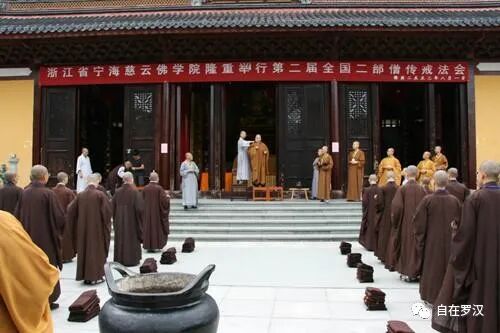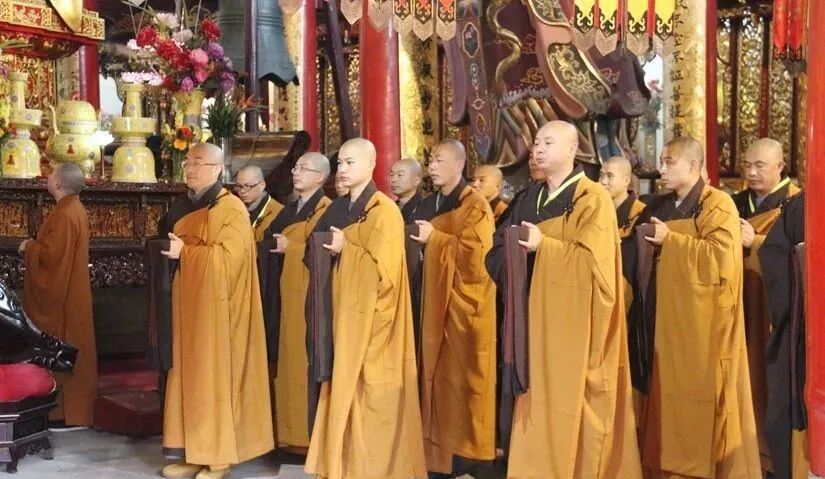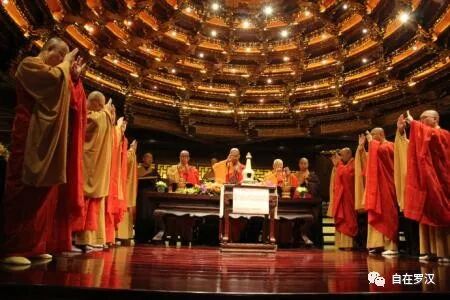
Verse on the Virtue of Renunciation
In the cycle of the three realms, love and attachment cannot be escaped.
Abandoning love and entering the state of non-action, the true benefactor.
Well done, great man, who can understand the impermanence of the world,
Leaving the mundane for Nirvana, a rare and profound thought.
Taking refuge in the Great Awakening, able to liberate from the suffering of the three realms,
May all beings universally enter the joy of non-action.

Originally, renunciation is extremely great; the identity of a renunciant is the king of all identities. However, some people often have various misunderstandings about renunciation, they believe: Renunciants may be those who cannot survive, cannot find a partner, or have failed in their careers… In short, they think it is a last resort to shave their heads and hide in the mountains.
If one observes carefully, it becomes clear that there is nothing wrong with the choice of renunciants; the problem lies with worldly people, who cannot see through or let go. Fundamentally, it is due to being blinded by strong desires, making it impossible for them to understand the great choice of renunciants who have seen through and let go.
Compared to renunciants, there is no nobler identity in the world. The Emperor Renzong of the Northern Song Dynasty once praised: “The most precious in the world is to abandon the mundane and become a monk. If one can become a monk, they will receive offerings from gods and humans, becoming a disciple of the Tathagata, a relative of the sages.” The Emperor Shunzhi of the Qing Dynasty said: “Gold and jade are not precious; only the robe is the hardest to wear.” In the long cycle of rebirth, some have become emperors countless times, which is not rare; only this robe is the hardest to wear. Some have already donned this rare robe, and at this time, they should cherish their identity even more!
The “Nanda Renunciation Sutra” states: “If all beings in the three thousand great thousand worlds, during a great kalpa, give alms to their children, the merit obtained is not as great as taking a step towards silence with the mind of renunciation.” The “Fundamental Causes Sutra” states: “One day and one night of renunciation prevents falling into the three evil paths for twenty kalpas.”

In the “Buddha Speaks of the Virtue of Renunciation Sutra,” it is recorded: One day, the Buddha and Ananda went to the city of Varanasi to beg for food. A prince and a group of palace maids were entertaining on a high building. Upon hearing the music, the Buddha said to Ananda: “In seven days, this prince will die; if he does not renounce, he will fall into hell.”
So Ananda went to the prince to persuade him to renounce, and the prince accepted Ananda’s advice. In the first six days, the prince continued to enjoy himself, but on the seventh day, he came before the Buddha to request renunciation, and during one day and one night, he practiced pure precepts, after which he passed away.
The Buddha told Ananda: “This prince, due to the cause of renouncing and keeping precepts for one day and one night, after death was reborn in the realm of the Four Heavenly Kings, becoming the son of Vaisravana; after this life, he was reborn in the Trayastrimsha Heaven, becoming the son of Indra; after this life, he was reborn in the Yama Heaven, becoming the king of Yama… thus he traveled back and forth seven times among the six desire heavens, always becoming the son of a heavenly king. Finally, he will be reborn in the human realm, enjoying wealth and honor, and in his old age, he will develop a sense of renunciation, renounce the world, and achieve the fruit of a Pratyekabuddha.”

From this teaching, it can be understood: One day of renunciation and keeping precepts not only prevents falling into hell but also leads to rebirth in the heavenly realms, ultimately achieving the fruit of the path, illustrating the vast difference between renouncing and not renouncing.
The “Buddha Speaks of the Virtue of Renunciation Sutra” also states that creating obstacles for those who wish to renounce has great faults, while creating favorable conditions for renunciation has great merits. Therefore, if someone aspires to renounce, everyone must not create obstacles but should try to support them. As children, one should understand that if they want to repay their parents’ kindness, clothing, food, and money may not suffice, and their significance is limited; only leading their parents towards Buddhism, ideally helping them to renounce, can truly repay their deep kindness and virtue.
In summary, everyone should develop a sense of aversion to household life, viewing the mundane home as a prison. The “Jataka Tales” states: “In the same prison, do not think of joy.” The “Ten Abodes of the Abhidharma” states: “In the household, seeking much leads to suffering; in renunciation, having no desires leads to joy.” If one goes to the market, householders will want to buy this and that, seeking many things; while renunciants have fewer desires, thus their lives are much happier.
Therefore, a true renunciant with a sense of detachment, once leaving the household and embarking on the path of liberation, will never envy household life again, for they have found their permanent home. It is hoped that lay Buddhist disciples recognize the nobility of renunciation and aspire to it; even if there is no opportunity for renunciation in this life, they should vow to become pure renunciants in future lives.

